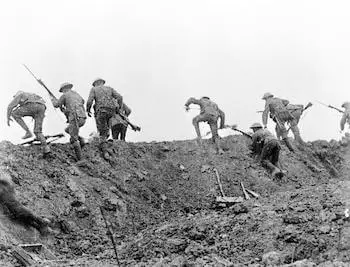To an excessive degree; beyond reasonable or acceptable limits.
Over the top
What's the meaning of the phrase 'Over the top'?
What's the origin of the phrase 'Over the top'?
was in WWI, describing advances made over
the top of allied trenches.
In the First World War the phrase was used by the British to describe the infantry emerging from the safety of their trenches to attack the enemy across open ground. An early example of that in print is from a 1916 edition of War Illustrated:
“Some fellows asked our captain when we were going over the top.”
More recently, with allusion back to the WWI usage, the phrase has come to describe excessive or foolhardy actions. This figurative use originated not long after the war and the earliest record of it that I’ve found is in Lincoln Steffens’ Letters, 1935:
“I had come to regard the New Capitalism as an experiment till, in 1929, the whole thing went over the top and slid down to an utter collapse.”
Since the 1980s, in the UK at least, the phrase is often shortened to OTT.
O. T. T. was the adult version of the anarchic children’s TV show Tiswas. It was broadcast by the UK television network Central Television in 1982.
Barr and York’s Official Sloane Ranger Handbook, 1982, included a definition of OTT:
“OTT, over the top – outrageous. Usually ‘absolutely’ or ‘totally OTT’.”
The history of “Over the top” in printed materials
Trend of over the top in printed material over time
Related articles
Browse more Phrases
About the Author

Phrases & Meanings
A-Z
A B C D E F G H I J K L M N O P Q R S T UV W XYZ
Categories
American Animals Australian Bible Body Colour Conflict Death Devil Dogs Emotions Euphemism Family Fashion Food French Horses ‘Jack’ Luck Money Military Music Names Nature Nautical Numbers Politics Religion Shakespeare Stupidity Entertainment Weather Women Work
How did we do?
Have you spotted something that needs updated on this page? We review all feedback we receive to ensure that we provide the most accurate and up to date information on phrases.
